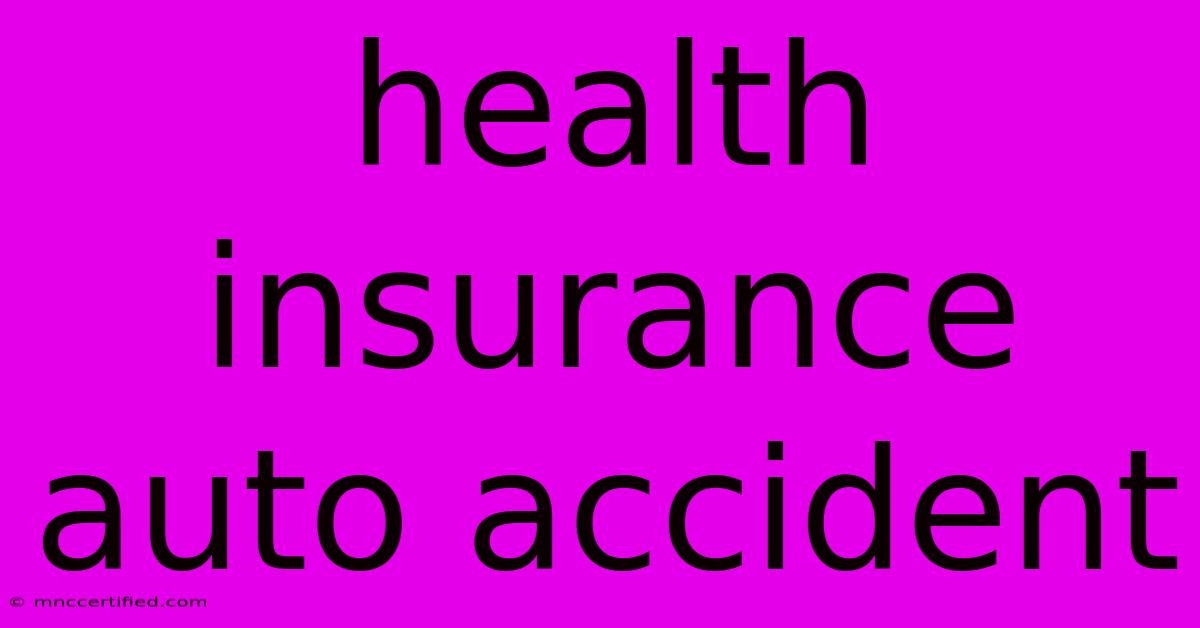Health Insurance Auto Accident

Table of Contents
Health Insurance After a Car Accident: What You Need to Know
Getting into a car accident is stressful enough, but navigating the complexities of health insurance afterward can feel overwhelming. Understanding your coverage and how it interacts with other insurance policies is crucial to receiving the medical care you need and avoiding financial burdens. This comprehensive guide will help you understand health insurance's role after an auto accident.
Understanding Your Health Insurance Coverage
Your health insurance policy, whether it's through your employer, the Affordable Care Act (ACA), or a private insurer, plays a vital role in covering your medical expenses following a car accident. However, the extent of coverage depends on several factors:
- Your Plan's Type: Different plans (HMO, PPO, POS) have varying levels of network restrictions and cost-sharing responsibilities. Understanding your plan's specifics is paramount.
- Your Deductible and Copay: You'll likely have to meet your deductible before your insurance significantly contributes to your medical bills. Copays are fixed fees you pay for each doctor's visit or service.
- Pre-existing Conditions: If you had pre-existing conditions that were exacerbated by the accident, your insurer might have specific rules regarding coverage.
- Coverage Limitations: Most health insurance policies have annual and lifetime limits on certain benefits. Check your policy documents for details.
Key Question: Does your health insurance cover emergency room visits, hospital stays, surgery, rehabilitation, and ongoing medical treatment related to your injuries? The answer is almost always yes, but the specifics are determined by your policy.
The Role of Your Auto Insurance
Your auto insurance policy, specifically your Personal Injury Protection (PIP) or Med-Pay coverage, also comes into play. These coverages help pay for your medical bills and lost wages, regardless of fault. Here's a breakdown:
- Personal Injury Protection (PIP): This covers medical expenses, lost wages, and sometimes other expenses for you and your passengers, regardless of who caused the accident. The amount of coverage is determined by your policy.
- Med-Pay Coverage: Similar to PIP, Med-Pay coverage pays for medical expenses, but it often has lower limits and might not cover lost wages. It's typically used to cover smaller medical bills or as a supplement to PIP.
Important Note: PIP and Med-Pay are designed to be first-party coverage, meaning they pay out regardless of fault. This means you can use your own insurance to pay for your medical expenses while the liability claim is being sorted out with the other party's insurance.
Coordinating Health and Auto Insurance
Often, both your health and auto insurance will be involved in covering your medical expenses. The coordination can be complex, but here's a general idea:
- PIP/Med-Pay First: Typically, your auto insurance’s PIP or Med-Pay coverage will be the primary payer for your medical bills up to the policy limits.
- Health Insurance Secondary: Your health insurance will often act as a secondary payer, covering expenses exceeding your auto insurance limits or expenses not covered by your auto insurance.
- Subrogation: Your health insurance company might seek reimbursement from the at-fault driver's insurance company (or your own, if you were at fault) for the medical expenses they paid. This is called subrogation.
Tip: Keep meticulous records of all medical bills, treatment plans, and communication with both your health and auto insurance companies. This will help avoid disputes and ensure you receive proper reimbursement.
Seeking Legal Advice
If your injuries are severe, or if the other driver is clearly at fault, consulting a personal injury attorney is strongly recommended. They can help you navigate the complexities of insurance claims, ensure you receive fair compensation, and deal with any potential disputes.
Conclusion: Proactive Planning for Peace of Mind
Being involved in a car accident is a stressful experience. By understanding your health and auto insurance coverage before an accident occurs, you can significantly reduce the stress and financial burden afterward. Review your policies, understand your rights, and don't hesitate to seek professional help when needed. Proactive planning leads to peace of mind.
Keywords: health insurance auto accident, car accident insurance, auto accident medical bills, PIP coverage, Med-Pay coverage, health insurance claims, auto insurance claims, personal injury protection, subrogation, car accident lawyer, health insurance after car accident, coordinating health and auto insurance.

Thank you for visiting our website wich cover about Health Insurance Auto Accident. We hope the information provided has been useful to you. Feel free to contact us if you have any questions or need further assistance. See you next time and dont miss to bookmark.
Featured Posts
-
Champions League Bar 3 0 Bre Recap
Nov 27, 2024
-
Kornegay Insurance Mt Olive Nc
Nov 27, 2024
-
Major Supermarket Hit By Stock Shortages
Nov 27, 2024
-
Three Aisles Empty At Morrisons Stores
Nov 27, 2024
-
Strickler Insurance Lebanon Pa
Nov 27, 2024